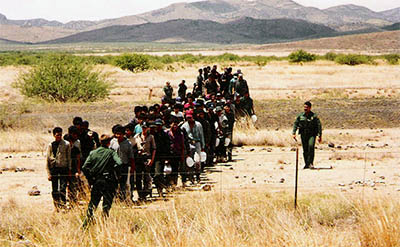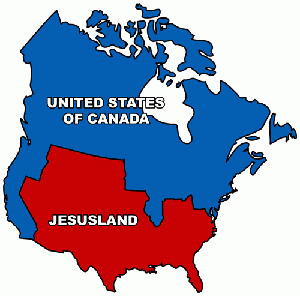Article VII of the US Constitution reads, in part:
A large contingent of Americans, to include legal scholars, wrongly understand this to mean that the Constitution would be binding on all 13 states, so long as at least 9 ratified the Constitution. But, this is directly against the text. And, as Madison states in The Federalist, No. 43, "...no political relation can subsist between the assenting and dissenting states...", clearly articulating the proposition that the Constitution only binds those states who explicitly choose to adopt and ratify the Constitution.
But, if this is the case, why the requirement of nine states? The Constitution, so understood, looks to be no more than a league or a treaty, and leagues and treaties are often formed between no more than two states. We ought to recognize the nine states requirement as a measure of prudence and security. At the time, the inhabitants of the 13 states still faced large and looming threats from powerful foreign forces. Nine states could be thought sufficient to repel an invasion from overseas; nine out of 13 could be thought sufficient to repel possible attacks from those states who did not submit. So, nine was the number, and if nine were not found, then the Constitution would return to the drawing board.
How does this pertain to secession, however? Once a state has ratified the Constitution, ought we think it is forever bound to the Constitution, without regard to Constitutional changes and amendments?
Article V of the Constitution enumerates the amendment process: 3/4 of the states must ratify amendments for the amendments to become a part of the Constitution. What of the other 1/4, though? Unfortunately, unlike Article VII, Article V tells us nothing of how to deal with the states that do not explicitly ratify the proposed amendments. That said, though, if we understand the reasoning behind the enunciation of Article VII, we ought to apply it to Article V. After all, amendments to the Constitution supply us with a Constitution which, in toto, has not been not necessarily been ratified by each state. We ought to see the 3/4 requirement as, again, a requirement of security and prudence, and not as some collective authoritarianism dictate of the kind, "Look, everyone else has assented, so we are forcing your assent".
That being the case, for each amendment proposed and ratified, each state that dissents has a Constitutionally valid justification for seceding from the Union; i.e., the Union has no justification for intervening to retain the state in the Union. Further, there is no Constitutional argument for implied consent among the states. There is no time in which a state which remains a part of the Union yet that refused to ratify a proposal that is now an amendment can be said to have ratified and assented to the amendment simply because said state hung around and remained in the Union. Thus, at any point in time after an amendment has been ratified, a state that dissented has Constitutional permission to leave the Union, and the Federal Government has no Constitutional authority to challenge such actions taken by the seceding state.
The implications of this understanding loom large. Insofar as ratified amendments are not ratified unanimously, every proposal of a new amendment takes on a greater risk of the dissolution of the United States. Suppose 49 Amendments have been ratified, each with a different state dissenting (49 Amendments, 49 dissents, 1 dissent for 1 state, 1 state, say Kansas, excluded). Now suppose a new amendment is proposed and all Kansas is the only state to dissent. Not only can Kansas secede, a secession whose permission is Constitutionally valid, but so can all other 49 states. The only method available to the federal government to stop such secession would be the immediate repeal of the contentious amendments (thus, returning to Constitutions to which each of the states has explicitly agreed and assented).
Note: states that voluntarily join the Union assent to the Constitution and all of its amendments, at that time, in toto.
The Ratification of the Conventions of nine states, shall be sufficient for the Establishment of this Constitution between the States so ratifying the Same/
A large contingent of Americans, to include legal scholars, wrongly understand this to mean that the Constitution would be binding on all 13 states, so long as at least 9 ratified the Constitution. But, this is directly against the text. And, as Madison states in The Federalist, No. 43, "...no political relation can subsist between the assenting and dissenting states...", clearly articulating the proposition that the Constitution only binds those states who explicitly choose to adopt and ratify the Constitution.
But, if this is the case, why the requirement of nine states? The Constitution, so understood, looks to be no more than a league or a treaty, and leagues and treaties are often formed between no more than two states. We ought to recognize the nine states requirement as a measure of prudence and security. At the time, the inhabitants of the 13 states still faced large and looming threats from powerful foreign forces. Nine states could be thought sufficient to repel an invasion from overseas; nine out of 13 could be thought sufficient to repel possible attacks from those states who did not submit. So, nine was the number, and if nine were not found, then the Constitution would return to the drawing board.
How does this pertain to secession, however? Once a state has ratified the Constitution, ought we think it is forever bound to the Constitution, without regard to Constitutional changes and amendments?
Article V of the Constitution enumerates the amendment process: 3/4 of the states must ratify amendments for the amendments to become a part of the Constitution. What of the other 1/4, though? Unfortunately, unlike Article VII, Article V tells us nothing of how to deal with the states that do not explicitly ratify the proposed amendments. That said, though, if we understand the reasoning behind the enunciation of Article VII, we ought to apply it to Article V. After all, amendments to the Constitution supply us with a Constitution which, in toto, has not been not necessarily been ratified by each state. We ought to see the 3/4 requirement as, again, a requirement of security and prudence, and not as some collective authoritarianism dictate of the kind, "Look, everyone else has assented, so we are forcing your assent".
That being the case, for each amendment proposed and ratified, each state that dissents has a Constitutionally valid justification for seceding from the Union; i.e., the Union has no justification for intervening to retain the state in the Union. Further, there is no Constitutional argument for implied consent among the states. There is no time in which a state which remains a part of the Union yet that refused to ratify a proposal that is now an amendment can be said to have ratified and assented to the amendment simply because said state hung around and remained in the Union. Thus, at any point in time after an amendment has been ratified, a state that dissented has Constitutional permission to leave the Union, and the Federal Government has no Constitutional authority to challenge such actions taken by the seceding state.
The implications of this understanding loom large. Insofar as ratified amendments are not ratified unanimously, every proposal of a new amendment takes on a greater risk of the dissolution of the United States. Suppose 49 Amendments have been ratified, each with a different state dissenting (49 Amendments, 49 dissents, 1 dissent for 1 state, 1 state, say Kansas, excluded). Now suppose a new amendment is proposed and all Kansas is the only state to dissent. Not only can Kansas secede, a secession whose permission is Constitutionally valid, but so can all other 49 states. The only method available to the federal government to stop such secession would be the immediate repeal of the contentious amendments (thus, returning to Constitutions to which each of the states has explicitly agreed and assented).
Note: states that voluntarily join the Union assent to the Constitution and all of its amendments, at that time, in toto.







